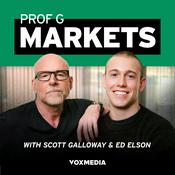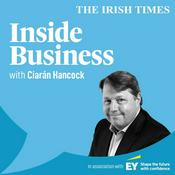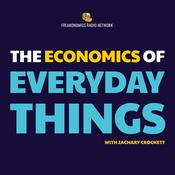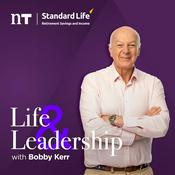88 episodes

Ep88 What If Employers were Legally Responsible For Your Wellbeing?
05/1/2026 | 40 mins.
Send us a textA million more people are now economically inactive for health reasons than just a few years ago, and once an employee has been on sick leave for a year or more, the chance of returning drops to around 3%. That is not a wellness statistic. It is a warning light for businesses, communities and the economy and it is the spark for this conversation with Poppie Foakes, Director of Product and Innovation at the Retail Trust, and our Chief Psychology Officer, Dr Amanda Potter.We unpack how prevention beats crisis by design. Poppie explains how the Retail Trust supports a dispersed, shift‑based workforce with tools that actually fit real lives: de‑escalation and resilience training for frontline abuse, virtual GPs that work around rotas, online CBT, and financial coaching that targets the number one anxiety driver in retail. We dig into the evidence, linking preventive investment to lower absenteeism, reduced presenteeism, and fewer leavers critical in a sector where replacing a colleague can cost around £5,000. We also explore why health inequalities persist between head office and store teams, and how simple changes in access and language can close that gap.The conversation gets practical. We share the three culture levers that keep people, fair pay, a strong line manager relationship, and clear purpose and show how they map to psychological safety. Poppie takes us inside their data engine: happiness assessments that generate personal action plans, platform analytics that surface early risk, and emerging agentic AI that recommends targeted campaigns by role, region or demographic. We talk about the Keep Britain Working Review and a future where employers are incentivised or mandated to handle prevention, potentially shrinking a £15 billion annual burden on benefits and healthcare that could rise to £25 billion by 2030.If you lead people, manage a store, or shape HR strategy, you will come away with actionable ideas: train line managers to signpost not shoulder, normalise de‑escalation skills for every frontline worker, make financial education part of culture, and put colleague sentiment on the agenda next to sales. And if you are personally feeling the strain, you will hear small, realistic habits to set boundaries, protect energy, and find one daily moment of joy that keeps you steady.Enjoyed the conversation? Follow and subscribe, share this episode with a colleague who needs it, and leave a quick review so more leaders can build healthier, happier, high‑performing teams.Episodes are available here https://www.thecpo.co.uk/ To follow Zircon on LinkedIn and to be first to hear about podcasts, publications and news, please like and follow us: https://www.linkedin.com/company/betalent-by-zircon/ To access the research white papers mentioned in this and other podcasts, please go to: https://www.betalent.com/research For more information about the BeTalent suite of tools and platform please contact: [email protected]

Ep87 Why Today’s Leaders must be both Ruthless and Caring with Amy Walters Cohen
15/12/2025 | 45 mins.
Send us a textComplexity is rising, expectations are colliding, and the old playbook is running out of pages. We sit down with author and applied researcher Amy Walters Cohen to unpack the core idea behind her book Ruthlessly Caring to understand how leaders can deliver more value when they replace either-or choices with both-and mindsets that match today’s messy reality.We start by mapping the megatrends shaping work for example, ageing populations, climate pressure, AI, regulatory shifts, and why they demand a step change in how we decide, communicate, and execute. From there, we break down five paradox mindsets that help leaders hold tension without freezing: ruthlessly caring (making hard calls with real compassion), confidently humble (projecting credible direction while admitting what you don’t know), politically virtuous (coupling ethics with savvy influence), ambitiously appreciative (sustaining high standards with renewal and gratitude), and responsibly daring (protecting the enterprise while innovating with smart guardrails).Amy shares practical ways to find the sweet spot for each paradox, not a bland compromise, but just enough of both poles to work under pressure. We talk psychological safety, radical candour, and how senior behaviour sets unwritten rules faster than any policy. You’ll hear how to diagnose overplayed and underplayed tendencies, why team diversity helps but doesn’t replace personal growth, and how to start with small, targeted habits that compound into culture change. Whether you lead a regulated function, a fast-scaling team, or a complex portfolio, you’ll come away with a sharper language for trade-offs and a toolkit for better decisions.Enjoy the conversation? Subscribe, leave a quick review, and share this episode with a leader who’s balancing tough choices this week. Your feedback helps more people find thoughtful, evidence-based leadership content.Episodes are available here https://www.thecpo.co.uk/ To follow Zircon on LinkedIn and to be first to hear about podcasts, publications and news, please like and follow us: https://www.linkedin.com/company/betalent-by-zircon/ To access the research white papers mentioned in this and other podcasts, please go to: https://www.betalent.com/research For more information about the BeTalent suite of tools and platform please contact: [email protected]

Ep86 From Tragedy to Resilience: How Forgiveness Shaped Martyn's Law
24/11/2025 | 29 mins.
Send us a textResilience emerges from the most unthinkable circumstances in this powerful conversation with Figen Murray OBE, whose son Martyn was killed in the 2017 Manchester Arena bombing. What follows is an extraordinary story of transformation through grief, forgiveness, and purpose-driven advocacy.Figen shares the raw reality of how her life changed in "the split second it took for a suicide bomber to detonate a bomb" - not just losing her son, but also her identity as a psychotherapist. With disarming honesty, she describes her initial "zombie-like state" and the profound shift in her worldview that made it impossible to continue her therapeutic practice.The conversation takes a remarkable turn when Figen reveals her decision to publicly forgive the bomber just weeks after the attack. Despite facing intense criticism and online trolling, this act of forgiveness "cleansed my heart and soul" and aligned with her core values. Her powerful insight that "a sour mind creates a sour body" illuminates the physical and emotional toll of carrying hatred.What truly distinguishes Figen's journey is how personal tragedy transformed into a legislative mission. After discovering alarming security gaps at venues 18 months post-attack, she launched a six-and-a-half-year campaign that culminated in Martin's Law - now requiring mandatory security measures at venues hosting 200+ people across the UK. Through governmental changes, pandemic disruptions, and political opposition, Figen found that "every knockback made me even more resilient, more determined and stronger."Perhaps most moving is Figen's work with young people, having spoken to over 32,000 students about online dangers and the importance of values like kindness and compassion. When asked what motivates her tireless advocacy, her answer is heartbreakingly simple: "Having my son's ashes on a bookshelf at home is a really good motivator."This conversation offers profound insights into human resilience, the healing power of purpose, and how even the darkest tragedy can catalyze positive change when approached with courage and compassion. Join us for this deeply moving exploration of how one woman's grief became a gift of safety for millions.Episodes are available here https://www.thecpo.co.uk/ To follow Zircon on LinkedIn and to be first to hear about podcasts, publications and news, please like and follow us: https://www.linkedin.com/company/betalent-by-zircon/ To access the research white papers mentioned in this and other podcasts, please go to: https://www.betalent.com/research For more information about the BeTalent suite of tools and platform please contact: [email protected]

Ep85 Presenteeism: Why Working When You Shouldn't Is Hurting Your Brain
03/11/2025 | 29 mins.
Send us a textEver pushed yourself to work through illness or stayed late just to be present at work and be seen? Your brain might be paying a devastating price.Presenteeism, means showing up physically but functioning below capacity due to illness, injury, or simply staying longer than necessary. This costs UK businesses a staggering £100 billion annually. Yet unlike absenteeism, it remains largely unmeasured and unaddressed in most organisations.The neuroscience reveals why this matters so deeply. When we work while unwell, our brains operate in conflict, diverting precious cognitive resources to manage pain or stress before productive work even begins. The anterior cingulate cortex, which processes both physical and social pain, lights up when we fear letting colleagues down—driving us to show up when we shouldn't. Meanwhile, receiving praise for "pushing through" triggers dopamine rewards that reinforce this harmful pattern.Most alarmingly, chronic presenteeism physically changes your brain. The hippocampus can actually shrink under prolonged stress, affecting memory and learning capacity. Neural connectivity in the prefrontal cortex weakens, reducing judgment, concentration, and emotional regulation. What many attribute to "just getting older" might actually be the cumulative effect of insufficient recovery.The good news? Our brains possess remarkable neuroplasticity. By prioritising psychological safety, resilience training, and supportive policies, organisations can combat presenteeism while enhancing performance. Leaders play a crucial role by modelling healthy boundaries and creating cultures where wellbeing and productivity coexist rather than compete.Ready to transform how you think about rest and recovery? Connect with us on LinkedIn or visit thecpo.co.uk to continue this vital conversation about creating workplaces where people truly thrive.Episodes are available here https://www.thecpo.co.uk/ To follow Zircon on LinkedIn and to be first to hear about podcasts, publications and news, please like and follow us: https://www.linkedin.com/company/betalent-by-zircon/ To access the research white papers mentioned in this and other podcasts, please go to: https://www.betalent.com/research For more information about the BeTalent suite of tools and platform please contact: [email protected]

Ep84 Unmasking Bias in 360 Assessments
13/10/2025 | 34 mins.
Send us a textWhat if the 360 feedback you're receiving is more a reflection of human cognitive shortcuts than your actual performance? In this illuminating conversation, Dr. Amanda Potter—recently named Association of Business Psychologists Practitioner of the Year 2024—takes us behind the scenes of 360 assessments to reveal the hidden biases that distort results and undermine effectiveness.Our brains evolved to make quick judgements for survival, but these same mechanisms now create significant distortions in how we perceive and rate others. From contrast effect (where we compare individuals against each other rather than objective standards) to recency bias (overemphasizing recent events) and the halo/horns effect (letting one trait color our entire perception), these mental shortcuts compromise the validity of feedback at every stage of the 360 process.Dr. Amanda Potter the Chief Psychology Officer breaks down exactly how bias infiltrates each phase, from design and administration to completion and feedback conversations, while offering practical, science-backed strategies to minimize its impact. Learn why rigid capability models fall short, how standardized communication prevents experience bias, why a seven-point rating scale creates more accurate results, and how to facilitate feedback conversations that explore context rather than make judgements about character.This episode delivers exceptional value for HR professionals implementing 360 programs, leaders receiving feedback, and anyone involved in developing talent. You'll discover why psychological safety forms the foundation of honest feedback, how to ensure anonymity without sacrificing insight, and the critical balance between quantitative ratings and qualitative perspectives that creates truly developmental experiences.Whether you're designing a new 360 program or participating in one, this conversation will transform how you understand, administer, and interpret multi-source feedback. Connect with us on LinkedIn by searching for Caitlin Cooper and Dr. Amanda Potter, or visit www.thecpo.co.uk for more resources on bringing psychology into leadership development.Episodes are available here https://www.thecpo.co.uk/ To follow Zircon on LinkedIn and to be first to hear about podcasts, publications and news, please like and follow us: https://www.linkedin.com/company/betalent-by-zircon/ To access the research white papers mentioned in this and other podcasts, please go to: https://www.betalent.com/research For more information about the BeTalent suite of tools and platform please contact: [email protected]
More Business podcasts
Trending Business podcasts
About The Chief Psychology Officer
Listen to The Chief Psychology Officer, Aspire with Emma Grede and many other podcasts from around the world with the radio.net app

Get the free radio.net app
- Stations and podcasts to bookmark
- Stream via Wi-Fi or Bluetooth
- Supports Carplay & Android Auto
- Many other app features
Get the free radio.net app
- Stations and podcasts to bookmark
- Stream via Wi-Fi or Bluetooth
- Supports Carplay & Android Auto
- Many other app features


The Chief Psychology Officer
download the app,
start listening.






































